| |
|
|
Seminar on
Today's Pakistan
and Quaid's Legacy
Organised By
MUSLIM Institute
|
|






|
|
MUSLIM Institute Organized a Seminar "Today's Pakistan and Quaid's Legacy" on Monday September 10, 2018 at National Library, Islamabad. Mr. Omar Ayub khan, the Federal Minister for Energy was the chief guest on the occasion. Prof. Ayub Sabir (Writer and Analyst), Dr. Farooq Ahmad Dar (Associate Professor, Dept. of History, Quaid-i-Azam University), Rana Abdul Baqi (Founder Jinnah Iqbal Fikri Forum) shared their remarks in the seminar. Chairman MUSLIM Institute, Sahibzada Sultan Ahmad Ali gave the welcoming remarks. Mr. Ahmad Alqadri (Research Associate MUSLIM Institute) moderated the proceedings of the session. Researchers, students, academicians, representatives of think tanks, journalists, political leaders, and people from different walks of life participated in the seminar.
Brief Summary of the views shared by the Speakers is observed as under:
|
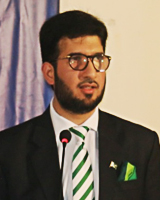
|
Welcoming Remarks
Sahibzada Sultan Ahmad Ali
Chairman, MUSLIM Institute
|
|
Today’s seminar has been organized in connection with the death anniversary of Quaid-e-Azam. In my opinion, only Quaid’s ideology can lead us towards national cohesion. The ideology of Pakistan cannot be understood without Muhammad Ali Jinnah. Most of us have fallen a prey to the political negligence as well as political polarization. Even today, thinkers idealize that Quaid remained as the ambassador of Hindu Muslim Unity for almost two and a half decades. What made the ambassador reaching to the conclusion that there exist two separate nations simultaneously propagating the importance of two nation theory? Primarily, it was Nehru Report (1928) which disregarded the fundamental political rights of the Muslims and played a very vital role in changing Quaid’s ideas. Another corner stone was the round table conferences especially the second round table conference, in which Quaid’s determination came out with full vigor and clarity regarding his demand of a separate homeland. The final blow was the political consequences of congress ministries which completely changed Quid’s viewpoint. Furthermore, an exchange of letters between Quaid and Iqbal further strengthened Quaid’s position. On the eve of March 23, 1940, Quaid clearly demanded for the establishment of Pakistan and also admitted Iqbal’s central role in this regard. The ideological principles of Jinnah can guarantee the unity and survival of Pakistan. However, Quaid’s ideology of Pakistan is universal among existing political ideologies.
|
|
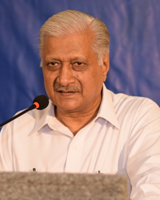
|
Challenges to National Integration in Pakistan: Lessons from Pakistan Movement
Rana Abdul Baqi
Renowned Columnist & Chairman, Jinnah Iqbal Fikri Forum
|
|
Mr. Jinnah was truly inclined towards Islam having a deep love for the Holy Prophet (PBUH). Even the front wall of his alma mater in London carried the saying that Muhammad (PBUH) is the personality who granted law to this world. In 1934, he came back over the insistence of Allama Iqbal and some other prominent leaders in order to unite Muslims politically who were on the verge of political disintegration. Iqbal’s poetry as well as philosophical work provided Quaid with the ideological roadmap on which Quaid continued his struggle. In 1944, during an interview, British journalist asked him that whenever you talk about the rights of Muslims, do you refer it to religion? Quaid made it clear that Islam is a complete code of life encompassing guidance regarding every walk of life. When Lord Mountbatten presented the division plan of the subcontinent on June 3, 1947, he was questioned by the then Prime Minister Lord Attlee that we were supposed to transfer power to united India not by dividing India. Mountbatten replied and regarded the division as temporary and hoped that both the nations would ultimately join Commonwealth later on. Same were the views of Jawaharlal Nehru and even the executive committee of congress labeled this division only for the sake of freedom from the British. Soon after independence, they left no stone unturned to disintegrate Pakistan; they instigated Bengalis over the issue of language and gave air to Pashtun Movement. Today successive governments are responsible for our socio-political decay. We have to revisit the ideology of Quaid and Iqbal in our political journey.
|
|
|
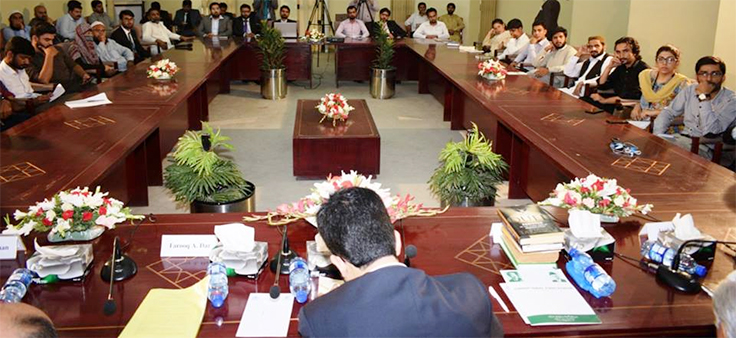
Hall view and participants of Seminar.
|
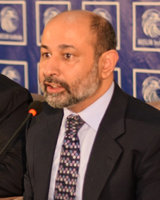
|
Pakistan’s Foreign Policy in the Light of Quaid-e-Azam’s Vision
Dr. Farooq Ahmad Dar
Associate Professor, Dept. of History, Quaid-i-Azam University, Islamabad
|
|
The foresight of Quaid-e-Azam Muhammad Ali Jinnah about Foreign Policy of Pakistan can be described on the basis of following Principles. 1) Peace within and peace outside. 2) Importance of unbiased and active role of international arbitrary organization such as United Nations to resolve the conflicts among different states. 3) Supporting the right of self-determination of all the nations across the globe. Jinnah was a great advocate of right of self-determination of Palestinian people. From 1933 to 1946, eighteen resolutions were passed by Muslim League for right of Palestinian people. He was also supporting the right of self-determination for non-Muslim countries like Burma and Ceylon. 4) Cooperation with Muslim counties. The first foreign visit paid by Feroz Khan Noon to Muslim countries like Turkey, Syria and Saudi Arabia is the prominent evidence of this principle. 5) To establish good relations with neighboring counties. 6) Policy of neutrality. Quaid wanted to establish good relations with India, however, he never accepted Indian supremacy.
At the time of partition there were only 150 staff members of the foreign office and only 4 amongst them were trained officers. Rest were of among peons and clerical staff. Prime Minister Liaqat Ali khan had the additional portfolio of first foreign minister till December 1947. Liaqat Ali Khan followed by Sir Zafarullah Khan remained in direct consultation of Jinnah vis-à-vis foreign affairs.
|
|
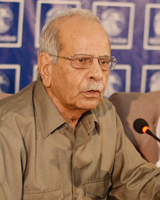
|
Quaid-e-Azam’s vision of post-independence political system in Pakistan
Prof. Ayub Sabir
Writer and Analyst
|
|
Quaid wanted a true democracy in accordance with the principles of Islam instead of parliamentary government of the western or congress type. It is a point to ponder for the ruling elite that today’s parliamentary as well as party system was not supported by Quaid. He further stressed that “We should have a State in which we could live and breathe as free men and which we could develop according to our own lights and culture and where principles of Islamic social justice could find free play”. Quaid was a staunch advocate of the rights of minorities. Quaid was of the opinion that framing of the future constitution of Pakistan is the responsibility of the constituent assembly. Quaid explained that Islam provide a complete code of life in the shape of Islamic law. Quaid made it clear to everyone that Islam granted us democratic norms some thirteen hundred years ago. Islamic democracy, on which both Iqbal and Quaid were agreed, is based on liberty, equality and unity. Quaid never supported capitalism, socialism or communism which is quite evident from his statement on November 20, 1945, “We have to fight a double-edged battle, one against the Hindu Congress and the other against the British Imperialists, both of whom are capitalist. The Muslims demand Pakistan, where they could live according to their own code of life, their own cultural growth, traditions and Islamic Laws”.
|
|
|

Stage view and participants of Seminar.
|
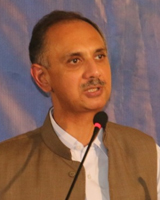
|
Chief Guest Remarks
Omar Ayub Khan
Federal Minister for Energy
|
|
During the reign of Mughal Empire, when East India Company was working in the subcontinent, this region was having a total share of 30 % in global trade volume. But shockingly, at the time of independence in 1947, this trade volume had shrunk to merely 1-2%. Why Muslims were forced towards the rejuvenation of two nation theory? Muslims had been living here for hundreds of years, what happened in 50 to 60 years of colonial period that Muslims were compelled to demand a separate homeland? Muslims were at the verge of economic decay and destruction. They were completely deprived of their socio-political rights. Important institutions like that of civil services and the military services were dominated by Hindus. Muslims were completely ignored in every walk of life and therefore for their due right, they demanded a separate homeland.
A state needs three things inevitably for its geographical stability. First is unity among nation, second is an incredible defense and third is a strong economy. We are well aware of the fact that we inherited hostile neighbor in the shape of India who always tried to destabilize Pakistan. But, we should not be worried as Pakistan is having an undefeatable defense line. Moreover, our strategic role in the region cannot be denied.
|
|
|
Interactive Session
|
|
|
There were three issues which Quaid-e-Azam wanted to resolve, these included Kashmir, constitution of Pakistan and settlement of refugees. Stance of Mr. Jinnah on Kashmir issue was crystal clear as he wanted right of self-determination for Kashmiris. When on October 27, 1947 Indian forces occupied Kashmir forcefully, Quaid decided to retaliate against Indian forces in Kashmir. But, at that time, the acting commander in chief, Gen. Gracey, referred this matter to the Field Marshal Auchinleck who refused to comply and also threatened that in case of pursuing the objective all the British officers of Pakistan army would resign. Therefore, instead of taking any emotional decision, Jinnah withdrew his decision, but no sooner did Indian forces crossed Uri sector when obeying Quaid's orders, Pakistani forces intervened in Kashmir. Therefore, support for Kashmir was always there on the agenda of Quaid-e-Azam.
Indra Gandhi clearly stated regarding dismemberment of Pakistan that they had drowned the Two Nation Theory in Bay of Bengal by creation of Bangladesh and taken revenge of 1000 years rule of Muslims over India. It is entirely wrong that Quaid’s declaration of Urdu as national language instigated wrath in East Pakistan. When his sister Mis Fatima Jinnah contested presidential election in 1964, she gathered enormous support from East Pakistan which denies the above mentioned misconception. Western democracy is not realistic in a sense that it cannot separate itself from capitalism which is the symbol of economic progress for developed nations and a tool of exploitation for undeveloped nations.
|
|
|
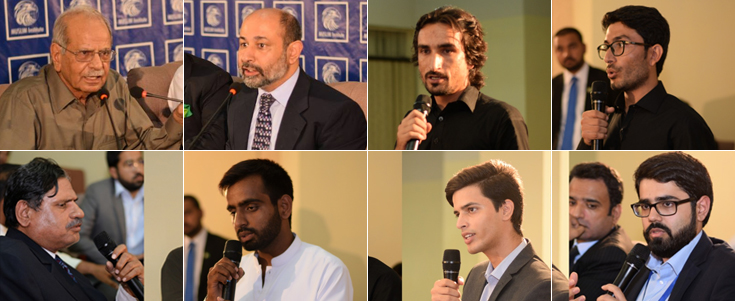
Participants asking questions during the interactive session of seminar.
|
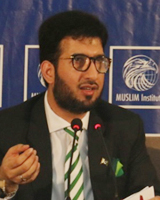
|
Closing Remarks
Sahibzada Sultan Ahmad Ali
Chairman, MUSLIM Institute
|
|
Rana Abdul Baqi referred to Chandar Singh in his speech who refused to migrate to India while claiming that his trust in Quaid is stronger than that of anyone else. In this respect, one finds Quaid equally appreciated among religious and secular circles. Whatever they extract from their discussions, they cannot deny Quaid’s viewpoint. It was the beauty of Quaid’s strategy and diplomacy that we enjoyed a brotherly relation with Afghanistan. Dr. Farooq Ahmad Dar presented six important points of Quaid’s vision regarding our foreign policy. Professor Ayub Sabir presented connection of Quaid and Pakistan with Prophet (PBUH). He referred to three principles of Quaid i.e. struggle for freedom, unity and equality. He also talked about Quaid’s speech on 11th August. I believe that no point in that speech is in contradiction with the Charter of Medina. Whenever I go through Iqbal’s poem “Masjid-e-Qurtaba”, I conclude two points. First is the vision of that mosque given by Iqbal and second is the builders of that Mosque and those Momin (believers) whom Iqbal talked about. In my view the best example of the Cordoba Mosque is Pakistan and that of builder is Quaid-e-Azam. Pakistan is not merely our political commitment but it is our spiritual commitment as same is the commitment of MUSLIM Institute.
|
|
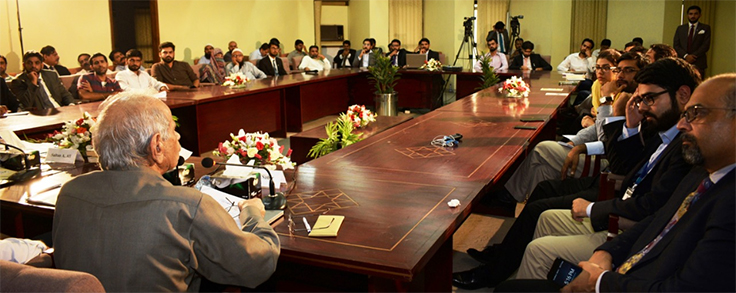
Prof. Ayub Sabir addressing the participants.
|

Omar Ayub Khan delivering his speech.
|
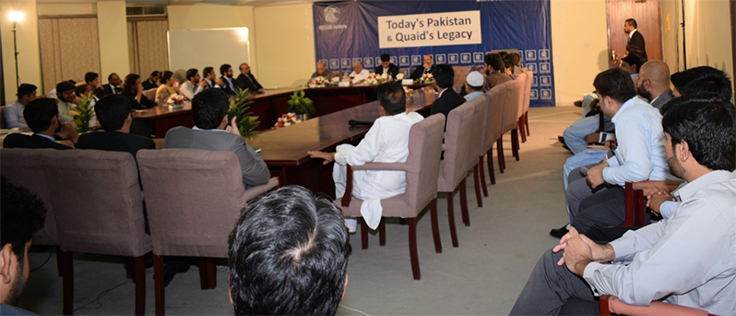
Stage view and participants of Seminar.
|
|
|
| |
|
|
|
|
|
| |
|